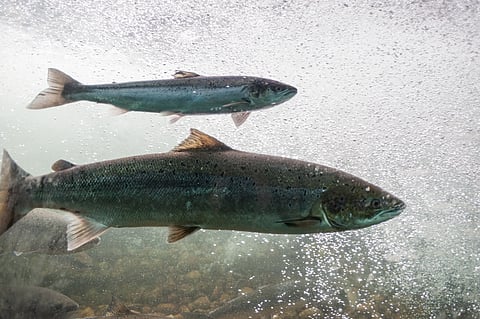

The proposed new oral vaccine will target the biology of the salmon louse during its parasitic phase.
Photo: Jakub Rutkiewicz / Adobe Stock.
A team of scientists led by Scotland's Moredun Research Institute has received £1.5M funding from the UK's Biotechnology and Biological Sciences Research Council (BBSRC) to develop an oral vaccine against salmon lice in farmed Atlantic salmon.
This initiative brings hope in addressing the significant problem of sea lice on the aquaculture industry, particularly on the health and welfare of marine-farmed fish species like Atlantic salmon.
Sea lice, especially the salmon louse, Lepeophtheirus salmonis, cause major economic losses estimated at $1 billion annually.
Current methods to control salmon lice have limitations and hinder industry expansion, the researchers point out.
The development of a commercial salmon louse vaccine would thus be a timely - and eco-friendly - solution, the Scottish research team says, which aligns with the Scottish Government's goal to double the value of Atlantic salmon production by 2030.
Traditional vaccine administration methods such as injections have had limited success, the researchers say.
That's why the team, led by Moredun's Dr. Kim Thompson and including experts in various fields such as ecto-parasitology and fish immunology, aims to create an oral vaccine.
The goal is for the new oral vaccine to stimulate an effective immune response in the salmon's skin, targeting the biology of the salmon louse during its parasitic phase.
“The development of an innovative salmon louse vaccine represents a groundbreaking approach in the aquaculture industry," said Dr Kim Thompson from Moredun Research Institute.
"By harnessing the power of reverse vaccinology and artificial intelligence, our interdisciplinary team is poised to deliver a practical, safe, and environmentally friendly solution for combating the problem of salmon lice."
"This vaccine, designed to enhance both systemic and mucosal immune responses in Atlantic salmon, promises not only to bolster the health and welfare of the fish but also to support the sustainable expansion of the Atlantic salmon industry," Thompson said.
The project involves advanced techniques like reverse vaccinology and artificial intelligence to identify key biological targets in the salmon louse. The selected antigens will be fused and expressed as a mosaic antigen using EpitoGen® scaffold technology, the research team said.
This project is a collaborative effort between the Moredun Research Institute, the University of Stirling’s Institute of Aquaculture, Bimeda Animal Health, and Vertebrate Antibodies Ltd.
